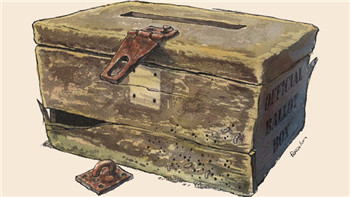有时,一两件事便可以改变全世界的政治气氛。在柏林墙倒塌仅仅3个月之后的1990年2月,纳尔逊•曼德拉(Nelson Mandela)获释了。这两件事鼓舞了全球各地的民主主义者和自由主义者。
Sometimes one or two events can change the political mood all over the world. The release of Nelson Mandela from prison in February 1990 came just three months after the fall of the Berlin Wall. Those two events inspired democrats and liberals across the globe.
不幸的是,目前的国际政治气氛要不乐观得多、对民主的态度也不友好得多。这首先是在2011年的“阿拉伯之春”溃败并导致流血事件与混乱局面的影响之下的结果。如今,世界各地、最重要的是俄罗斯和中国的独裁者,把中东说成是过早民主化带来危险的一个例证。
Sadly, the current international mood is much less optimistic and much less friendly to democracy. It has been shaped above all by the collapse of the Arab spring of 2011 into bloodshed and anarchy. Autocrats all over the world, above all in Russia and China, now point to the Middle East as an example of the dangers of premature democratisation.
1990年代初,代表着时代精神的政治家是曼德拉和捷克斯洛伐克的瓦茨拉夫•哈维尔(Václav Havel)等令人鼓舞的民主主义者,以及俄罗斯的米哈伊尔•戈尔巴乔夫(Mikhail Gorbachev)和鲍里斯•叶利钦(Boris Yeltsin)等自由派改革家。今天,象征着时代精神的领导人是根本不尊重民主价值观的独裁者——比如俄罗斯总统弗拉基米尔•普京(Vladimir Putin)和土耳其总统雷杰普•塔伊普•埃尔多安(Recep Tayyip Erdogan)等人;以及不知怎么当上了美国共和党总统候选人、爱讲“垃圾话”的煽动者纳德•特朗普(Donald Trump)。
The politicians who captured the spirit of the early 1990s were inspirational democrats such as Mandela, Václav Havel in Czechoslovakia — and liberal reformers such as Mikhail Gorbachev and Boris Yeltsin in Russia. Today, the leaders that seem to embody the spirit of the age are autocrats with scant respect for democratic values — men like Vladimir Putin and Recep Tayyip Erdogan, the presidents of Russia and Turkey; as well as Donald Trump, a trash-talking demagogue who has somehow become the Republican nominee for president of the US.
这些人物证实了一个总体印象:这是一个对民主主义者而言的糟糕时期。每年发布各国民主状况的智库自由之家(Freedom House)认为,过去十年里,政治自由一直处于全球性衰退中。自由之家在今年早些时候称,2015年“当年自由程度降低的国家数量——72个——是这轮十年衰退开始以来最多的一次”。
The figures confirm the general impression that this is a bad period for democrats. Freedom House, a think-tank that issues an annual report on the state of democracy, argues that political freedom has been in global retreat for the past decade. It reported earlier this year that in 2015, “the number of countries showing a decline in freedom for the year — 72 — was the largest since the 10-year slide began”.
世界上最不自由的地区是中东。这一点令人非常失望,因为在5年前,席卷阿拉伯世界的反对独裁政权的暴动,曾唤起了人们的希望。如今,埃及民众正在忍受的独裁统治,其专制程度超过了2011年被推翻的穆巴拉克(Mubarak)政府。
The least free part of the world is the Middle East, which is a bitter disappointment given the hopes aroused by the uprisings against autocratic regimes that broke out across the Arab world five years ago. Egypt is suffering from a harsher autocracy than the Mubarak regime that was overthrown in 2011.
甚至在欧洲,在1989年赢得的一些自由也受到了威胁。在波兰和匈牙利,言论自由和司法独立遭到了削弱。在紧挨欧盟(EU)边界的土耳其,来之不易的自由正在丧失,记者和法官在一场未遂政变之后遭到逮捕。
Even in Europe, some of the freedoms won in 1989 are imperilled. In both Poland and Hungary there has been an erosion of press freedom and judicial independence. In Turkey, on the borders of the EU, hard-won freedoms are also being lost as journalists and judges are arrested in the wake of an attempted coup.
在亚洲的部分地区,也发生了倒退。2014年,泰国发生了一场军事政变,上周末的投票结果是支持一部可能强化军方对政局控制的新宪法。在马来西亚,自由主义者对丑闻缠身的政府的阴谋诡计感到失望,著名反对派领袖安瓦尔•易卜拉欣(Anwar Ibrahim)被再度投入监狱。
In part of Asia, things have also gone backwards. Thailand experienced a military coup in 2014 and this weekend voted in favour of a new constitution that could cement the military’s control over politics. In Malaysia, liberals are in despair at the machinations of the scandal-plagued government and Anwar Ibrahim, a prominent opposition leader, is once again in prison.
在俄罗斯和中国这两个最重要的独裁大国,政府正加大对于胆敢挑战现政权的自由主义者的打击力度。
In the two most important autocratic powers — Russia and China — the governments are cracking down harder on liberals who dare to challenge the prevailing regimes.
上周在中国天津,多名维权律师被判处了多年刑期,其他一些人被迫屈辱地道歉。大概在同一时间,俄罗斯知名反对派政治家叶夫根尼•乌尔拉绍夫(Yevgeny Urlashov)由于似乎为杜撰的腐败罪名,被判在一处流放地监禁12年。
Last week China issued long prison sentences for human rights lawyers in Tianjin and forced others into humiliating apologies. At about the same time, in Russia, Yevgeny Urlashov, a prominent opposition politician, was sentenced to 12 years in a penal colony on corruption charges that appear to have been trumped up.
民主的问题甚至蔓延到了美国这个“自由世界的领袖之国”。即便特朗普不能赢得总统选举,他已经给美国民主的声誉和尊严造成了莫大的伤害。
The problems of democracy have extended even into the US, the “leader of the free world”. Even if Mr Trump fails to win the presidency, he has already done immense harm to the prestige and dignity of US democracy.
但面对所有这些令人悲观的新闻,有必要记住,并非所有的趋势都沿着错误的方向演变。在缅甸,当曼德拉于1990年获释时处于软禁之中的昂山素季(Aung San Suu Kyi),已获得了自由,而且该国半个多世纪以来的首个文官政府在今年早些时候执掌了权力。在全球第四人口大国印尼,民主似乎已站稳脚跟。在非洲最大国家尼日利亚,去年总统选举中首次看到执政党败选,然后以和平方式移交了权力。
But amid all this bleak news it is important to remember that not all the trends are pointing in the wrong direction. In Myanmar, Aung San Suu Kyi — who was under house arrest when Mandela was released in 1990, has been freed — and the country’s first civilian-led government for more than half a century took power earlier this year. Democracy seems well established in Indonesia, the world’s fourth most populous country. And Nigeria, Africa’s largest country, last year saw its first presidential election in which an incumbent lost — and then ceded power peacefully.
最重要的是,仍有证据表明,尽管各国之间存在很大的文化和经济差异,但世界各地的普通民众终于受够了腐败、审查、不公正和政治暴力。
Most important of all, the evidence remains that, for all the cultural and economic differences between countries, ordinary people all over the world eventually get fed up of corruption, censorship, injustice and political violence.
就在上周末,埃塞俄比亚民众走上街头,进行了游行示威,反对那个虽然带来经济飞速发展、但也严重限制政治自由的政府。近些年来,支持民主的抗议者也走上香港和乌克兰的街头,要求获得政治与公民自由。
Just this weekend, people were out on the streets of Ethiopia, demonstrating against a government that has delivered rapid economic growth but also sharply restricted political freedoms. In recent years, pro-democracy demonstrators have taken to the streets of Hong Kong and Ukraine to demand political and civil liberties.
我们当下所处的这个时刻的不确定性,在南非目前的局势中得到了体现。南非曾在1990年代起到了那么鼓舞人心的作用。上周,曼德拉昔日所属政党非国大(ANC)在地方选举中支持率大幅下降,选民们以行动反对祖马(Jacob Zuma)政府的腐败和低效率。悲观看法是,祖马和他的密友们将尽其所能抓住权力不放——他们的阴谋诡计将进一步损害南非民主。乐观看法是,非国大的选举失利是一个例子,证明了民主具有更新政治局面的能力——选民们倒向了南非民主联盟(Democratic Alliance)等新政党。
The uncertain nature of the moment we are living through is captured by current events in South Africa, which played such an inspiring role in the 1990s. Last week the ANC, the party of Mandela, saw its support slump in local elections as voters reacted against the corruption and inefficiency of the government of President Jacob Zuma. The pessimistic view is that Mr Zuma and his cronies will do whatever it takes to hang on — and that their machinations will further damage South African democracy. The optimistic view is that the ANC’s electoral troubles are an example of democracy’s ability to renew politics as voters turn to new parties like the Democratic Alliance.
像祖马、普京和埃尔多安等领导人的焦虑,很能说明问题。在他们意气风发的背后,隐藏着一种深深的危机感。独裁或许会在全世界范围内进一步得势。但是,独裁终将遭到抵抗。
The very nervousness of leaders like presidents Zuma, Putin and Erdogan is telling. Behind their swagger lurks a deep insecurity. Autocracy might be making advances across the world. But it always ultimately sparks resistance.
